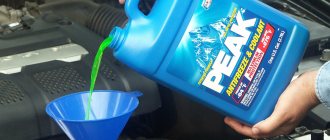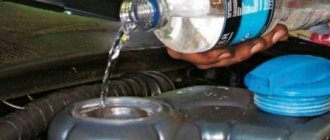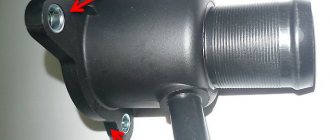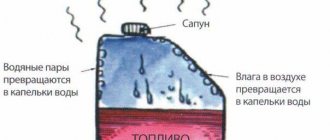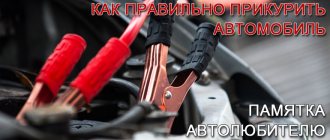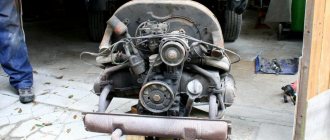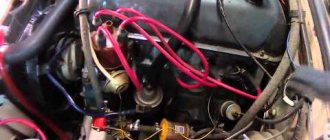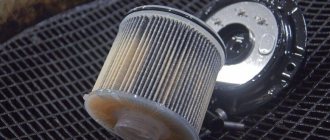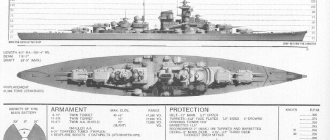- home
- Coolant
- …
Quite often I get asked questions regarding the car’s cooling system. One of the most common ones is whether you can put regular or distilled water in there? YES, not yet an ancient car, but modern foreign cars. Personally, it’s not entirely clear to me why to do this (after all, the savings are pretty cheap, as they say on the matches), but if there is a question, there will be an answer. I'll try to sort everything out. As usual there will be text + video version...
If you dig into the past (about 30 years ago), all cars ran on water and felt relatively good, then non-freezing liquids appeared ( antifreeze and antifreeze ) and after that the water left the radiators and the cooling system as a whole. And I think this is correct and actually increases the life of the car.
However, if you briefly answer the question, is it possible to add water instead of antifreeze or antifreeze - the answer is YES, YOU CAN! But for a short time, in an emergency situation. In all other cases, it is better to pour special liquids.
Why was water used to be poured in both winter and summer?
YES it’s simple, before there was simply no non-freezing liquid. More precisely, it was in limited quantities in the north, but was not distributed over the larger territory of our country.
Therefore, they poured ordinary, rarely distilled water. In winter (as my grandfather told me, he then worked on a ZIL truck), in the morning they poured boiling water into the engine (before the shift), and after work this water was drained (so that it would not simply freeze)
After the first antifreezes appeared in the West, in response, the first antifreezes appeared in the USSR. After that, a long way has been traveled, now antifreezes are already divided into various groups G11, G12, G13, they are tailored for various car systems (aluminum radiators or, say, copper-brass). BUT now this is not the point, I already talked about this in this article , it’s useful to read.
Cooling system and water
Let me remind you a little, why do we need a cooling system? What is its main function?
YES, everything is simple - it removes excess heat from the engine so that it does not overheat and it does not jam. With a liquid system, the engine life has increased significantly.
To prevent the coolant from stagnating in one place and boiling there, it needs to be pumped through the system - this is done by a pump (a special pump, belt-driven from the crankshaft). Well, excess heat needs to be dissipated somehow, this is done by the radiators of the car , the main one and the stove (in the cabin, thanks to it we are heated in the winter).
And here’s the thing - the car is completely indifferent to what kind of liquid will remove heat from the engine, the main thing is that the system is as efficient as possible.
I will say more - the heat capacity of antifreeze is about 3.5 kJ/(kg deg), and that of water is about 4.2 kJ/(kg deg) , that is, hypothetically, water is much more suitable for heat removal. But there are also disadvantages (more on them below).
What happens if you pour water into a foreign car?
If for a short time (say for a day, two or a maximum of a week) - there will be absolutely nothing! The main thing is to then drain the water and fill it with normal (as recommended by the manufacturer - antifreeze, according to tolerances). Well, it’s worth remembering about the temperature regime of the surrounding air; if the temperature outside is sub-zero, the water will simply freeze.
It’s worth mentioning right away that modern foreign cars often have sensors that can measure the density of the coolant, even if ordinary water is filled. The engine just won't start
Thus, if you need to rest for a short time, for example, you are on the road, but there are no shops in the area, and the radiator is leaking, then pour water - the main thing is that it is clean, without dirt. Nothing bad will happen!
BUT if you want to ride on a regular basis, I personally don’t recommend it.
Why shouldn't you pour water on a regular basis?
Water, especially if it comes from a tap, begins a rapid corrosion process, and the entire internal system of the engine and the cooling system as a whole consists of metals (and they are not always non-ferrous).
Rust will begin to fall out quite quickly, it will clog all the channels and passages (radiators are especially affected), and the pump impeller will quickly “eat” (pumping will not be as effective). In general, the system will begin to leak from all places possible, and will also constantly overheat (the machine will boil). In winter, freezing is generally possible (even at minus one degree Celsius), it will rupture all the pipes and hoses, and you will have to drain it every evening.
Why are antifreezes better? I've already talked about this, but I'll repeat it here:
The first is winter, they do not freeze even in severe frosts.
Secondly , all antifreezes are designed to fight corrosion, so they can be said to block rust, and even create a protective film on metal walls (for this they contain special additives). That is, they can be used for a VERY long time (but not indefinitely); however, additives have a certain service life.
Third , some antifreezes are made in such a way that they do not boil even at high temperatures and can last up to +110, +115 degrees Celsius.
Well, fourthly , now the price for them is not so high, a canister (5 liters) can be bought for 500 - 700 rubles.
Answer yourself this question: is a clogged system, and sometimes the replacement of radiators, pipes and hoses, or a pump eaten by rust worth 500 steering wheels in two years? The question, as they say, is rhetorical.
Is it possible to add water instead of antifreeze?
Let's imagine a situation: the coolant level in the tank is less than nominal and you need to add antifreeze.
Is it possible to add water in this case or mix antifreeze with water?
IN WHAT CASES CAN WATER AND ANTIFREEZE BE MIXED?
If we talk about the manufacturer’s recommendations, they strictly prohibit mixing antifreeze and water. This is explained by the fact that antifreeze contains appropriate additives that have a beneficial effect on the cooling system, namely, they have good lubricating and cooling abilities.
Ordinary water will cope with engine cooling, but how does it affect engine parts? On modern cars, cooling system parts are made of aluminum alloys and hard water can corrode them, which over time will lead to corrosion. In addition, the water in the cooling system passes through the thin holes of the radiator, which over time can become clogged and lead to constant overheating of the engine.
If you pour water into the cooling system instead of antifreeze, do so only at your own peril and risk. If old cars are still tolerant of this, then on modern foreign cars this can lead to problems.
You can only fill with distilled water (sold in auto stores), and ordinary tap water is prohibited in any case, because... it can damage engine parts and its cooling system.
WHEN CAN YOU ADD WATER INSTEAD OF ANTI-FREEZE?
When the situation is critical and there is no antifreeze on hand, you can add water to the cooling system. For example, when the radiator is leaking and you need to get to the repair site. But remember that after filling with water you will need to completely replace the antifreeze in the car.
Is it possible to use water instead of antifreeze in the summer? You can if you don't have a replacement at hand. In addition, in the past, car enthusiasts drove exclusively on water in the summer, because water and antifreeze have the same effect on the cooling capacity of the engine. But let us repeat once again, adding water to modern cars is extremely undesirable, and sometimes downright dangerous.
If you filled the cooling system with water instead of antifreeze, I recommend replacing it with antifreeze before the first cold weather begins. Even if only a little water is poured.
Is it possible to use water instead of antifreeze in winter? Doing this is strictly prohibited - in winter, water will freeze in the engine cooling system, which will lead to difficult starting. Frozen water in the expansion tank can rupture it or damage engine parts.
Fill only with high-quality antifreeze and then engine overheating will not be a problem.
Another myth about water
Many people think that water is not capable of properly cooling the system, and it will literally boil immediately (as we all know at +100 Celsius), and many high-temperature motors now operate at +110 degrees! So their water is contraindicated.
This makes sense. BUT, the people who express this were bad students at school. Look at the boiling of water under different conditions, it happens in different ways. If you increase the pressure, it will boil at +110 and +120 degrees.
And often the car’s cooling system is closed, and there is actually pressure there.
So very often it is approximately 1.2 - 1.4 ATM, and at a pressure of 1.5 ATM, boiling occurs at 110 degrees.
So water cooling is suitable for even the hottest engines.
Distilled water
If you want, it is recommended to dilute the antifreeze concentrate ; it can be poured in a 50/50 ratio. YES and in the short term, it is also desirable for filling (I mean getting to the service station).
The thing is that distilled liquid is just H2O without any impurities (salts, etc.) that can settle in the car’s cooling system. Therefore, it is used to dilute antifreeze and antifreeze.
However, again, it’s clean, you can’t fill it, it will cause all the disadvantages that I listed above, unless there is scale! And so it oxidizes the walls, freezes, and boils beautifully. So you can't!
Distilled water for the engine
Yes, there are practically no impurities in it, if you compare it with tap water, there are no salts and various metals, it is, so to speak, pure and neutral. And it seems like it should work effectively in the engine (but again in the summer, because in the winter it can also freeze).
BUT! After you add it to the internal combustion engine, it will very quickly react with the metals of the walls and pipes, and simply absorb dirt and deposits and quickly turn into ordinary.
So this is also not a panacea, and a canister of distillate also costs quite a bit, it’s better to look towards antifreeze or antifreeze.
Now let's watch the video version of the article.
This is where I end, in conclusion I want to say that sometimes they write to me that the radiator is leaking, there is no money to make yet, so I fill up with water (I’ve been driving for months), the car has recently started to heat up and boil. I always answer that you can’t do this, you save on “drips” with “water”, but cripple the rest of the system. Then a lot of things will need to be changed and washed. Moral of the story - don’t skimp, if the radiator is leaking, replace it or solder it, fill it with antifreeze, this is the best solution.
I’ll end here, sincerely yours AUTOBLOGGER
Similar news
- Expansion tank cap. How it works, basic principles
- Antifreeze (antifreeze) into the washer reservoir. Filled, what should I do?
- DIY WD-40. How to make an almost complete analogue
Add a comment Cancel reply
Misconceptions
It is clear that it is better not to add water in winter, but is it possible to add water instead of antifreeze in summer? This question also haunts many drivers.
Many people think that water will not be able to cool the system properly because it will immediately boil. For those who don’t know, boiling occurs at +100 degrees Celsius. Current engines operate at +110 and +120. Water is simply contraindicated for them.
But there is a big but in this situation. In fact, boiling occurs differently under different conditions. If you increase the pressure, the liquid will begin to boil only at +110 or + 120 degrees. The car cooling system has a closed structure with pressure. It is 1.2 - 1.4 ATM, and boiling at 110 degrees occurs only at a pressure of 1.5 ATM. This means that the water is also suitable for hot engines.
As for distilled water, it contains no impurities or salts compared to ordinary water. It is quite clean and one might say neutral. Many people think that they can certainly fill it in without fear of any consequences. However, it is not. After adding water to the internal combustion engine, it will instantly react with metal elements. It will also immediately become dirty and turn into ordinary water.
A canister of distilled water has the same cost as antifreeze or antifreeze. It would be more logical to purchase them.

